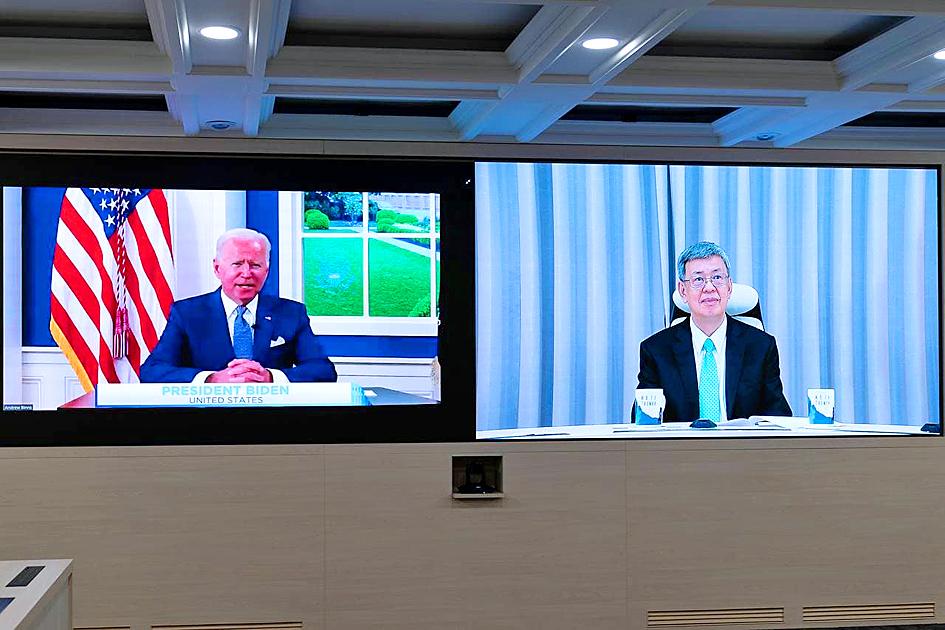Former vice president Chen Chien-jen (陳建仁) on Wednesday endorsed US President Joe Biden’s call to share vaccines with other countries during the Global COVID-19 Summit hosted by Biden.
The online summit was about supercharging efforts in three key areas: vaccinating the world, expanding the availability of medical treatment and public health tools, and reinforcing the global health security infrastructure, Biden said in his speech, a White House transcript showed.
Biden announced that the US would purchase another 500 million doses of BioNTech SE and Pfizer Inc’s COVID-19 vaccine to donate to low and middle-income countries.

Photo: Yang Cheng-yu, Taipei Times
“We need other high-income countries to deliver on their own ambitious vaccine donations and pledges,” Biden added.
In a pre-recorded speech, Chen thanked the Czech Republic, Japan, Lithuania, Poland, Slovakia and the US for donating COVID-19 vaccines to Taiwan.
Since the pandemic started, Taiwan has launched four waves of humanitarian assistance, and donated more than 54 million masks and other supplies to more than 80 countries, said Chen, an epidemiologist with Academia Sinica.
“Once there is enough supply to meet domestic need, we want to share our vaccines with other countries,” Chen said, adding that Taiwan would also continue to donate masks and other medical supplies to countries in need.
“For our common vision of building back better, we will seek to contribute to the global health security financial intermediary fund that the United States plans to establish,” he said.
Taiwan’s domestic COVID-19 vaccine, developed by Medigen Vaccine Biologics Corp (高端疫苗), was made available to people aged 20 or older from Aug. 23.
Medigen is conducting phase 3 clinical trials in Paraguay, while its plan to conduct similar trials in Europe has received a “positive response” from the European Medicines Agency, the firm said on Wednesday.
After Taiwan’s participation at an international meeting on fighting the Ebola virus in March, its participation in the US-led pandemic summit shows the two nations’ close cooperation on public health, the Ministry of Foreign Affairs said in a statement yesterday.
Also speaking at the event were US Vice President Kamala Harris, US Secretary of State Antony Blinken, Japanese Prime Minister Yoshihide Suga, South Korean President Moon Jae-in, and leaders from Australia, Germany and New Zealand, the ministry said.
“It’s good that the U.S. summit on #COVID19 included #Taiwan. Taiwan has been a leader in tackling the global pandemic and should be able to participate fully in #UNGA events on global health,” US Senator Jim Risch wrote on Twitter.

The US government has signed defense cooperation agreements with Japan and the Philippines to boost the deterrence capabilities of countries in the first island chain, a report by the National Security Bureau (NSB) showed. The main countries on the first island chain include the two nations and Taiwan. The bureau is to present the report at a meeting of the legislature’s Foreign Affairs and National Defense Committee tomorrow. The US military has deployed Typhon missile systems to Japan’s Yamaguchi Prefecture and Zambales province in the Philippines during their joint military exercises. It has also installed NMESIS anti-ship systems in Japan’s Okinawa

‘WIN-WIN’: The Philippines, and central and eastern European countries are important potential drone cooperation partners, Minister of Foreign Affairs Lin Chia-lung said Minister of Foreign Affairs Lin Chia-lung (林佳龍) in an interview published yesterday confirmed that there are joint ventures between Taiwan and Poland in the drone industry. Lin made the remark in an exclusive interview with the Chinese-language Liberty Times (the Taipei Times’ sister paper). The government-backed Taiwan Excellence Drone International Business Opportunities Alliance and the Polish Chamber of Unmanned Systems on Wednesday last week signed a memorandum of understanding in Poland to develop a “non-China” supply chain for drones and work together on key technologies. Asked if Taiwan prioritized Poland among central and eastern European countries in drone collaboration, Lin

Renewed border fighting between Thailand and Cambodia showed no signs of abating yesterday, leaving hundreds of thousands of displaced people in both countries living in strained conditions as more flooded into temporary shelters. Reporters on the Thai side of the border heard sounds of outgoing, indirect fire yesterday. About 400,000 people have been evacuated from affected areas in Thailand and about 700 schools closed while fighting was ongoing in four border provinces, said Thai Rear Admiral Surasant Kongsiri, a spokesman for the military. Cambodia evacuated more than 127,000 villagers and closed hundreds of schools, the Thai Ministry of Defense said. Thailand’s military announced that

CABINET APPROVAL: People seeking assisted reproduction must be assessed to determine whether they would be adequate parents, the planned changes say Proposed amendments to the Assisted Reproduction Act (人工生殖法) advanced yesterday by the Executive Yuan would grant married lesbian couples and single women access to legal assisted reproductive services. The proposed revisions are “based on the fundamental principle of respecting women’s reproductive autonomy,” Cabinet spokesperson Michelle Lee (李慧芝) quoted Vice Premier Cheng Li-chiun (鄭麗君), who presided over a Cabinet meeting earlier yesterday, as saying at the briefing. The draft amendment would be submitted to the legislature for review. The Ministry of Health and Welfare, which proposed the amendments, said that experts on children’s rights, gender equality, law and medicine attended cross-disciplinary meetings, adding that